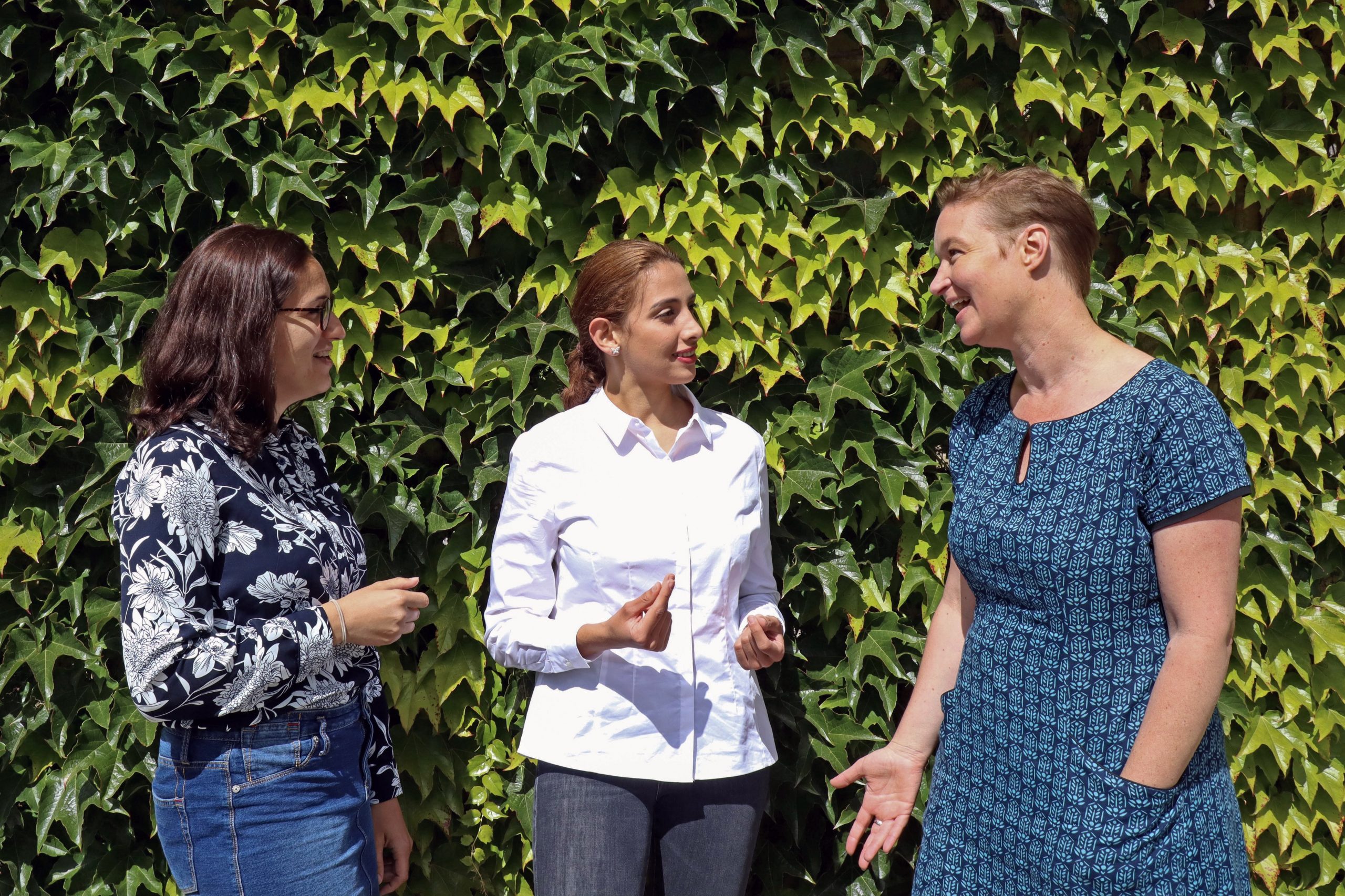Integrating Renewables in Denmark’s Power Sector
Meet the women leading the research in the Sustainability Division at DTU’s (Technical University of Denmark) Department for Management.
With the increased integration of renewables in Denmark, the country is well on its way to transforming the power sector, boasting Europe’s highest share of annual electricity demand covered by wind, and the highest per capita biogas production.
This leading position would be impossible without the vast research conducted on renewable energy on a national scope. The Sustainability Division at DTU’s (Technical University of Denmark) Department for Management is one of the contributors to this field. The division aims to develop sustainable, robust and technological innovation systems based on no- or low-carbon technologies and entities within the energy sector, urban areas, and land-use sectors. This requires an interdisciplinary approach, tackling the challenges and opportunities of the global energy transition across different disciplines including economics, systems modelling, sustainability development, decision-making modelling and policy analysis.
The Sustainability Division, formerly part of the Risø Research Institute, has been collaborating with national decision-makers in Denmark for more than 30 years, offering expertise in energy systems, policies, and regulation. With researchers strongly involved in the Danish Climate Council and the Intergovernmental Panel on Climate Change (IPCC), the division has been playing a significant role in making the Danish energy system one of the greenest in the EU.
Marie Münster, Sara Ben Amer, Tara Amirkhizi and Lise Skovsgaard Nielsen are amongst the women working in the team. We interviewed them to find out more about their research path and motivations in working towards an increasingly more decarbonised and sustainable energy future.

Marie Münster
Marie is a Professor in the Energy System Analysis group. She holds an M.Sc. in Energy Planning from the University of Aalborg and a joint degree in Energy system Modelling from University of Aalborg and Technical University of Denmark, where she has been employed since 2009. Prior to starting her PhD, she was working as an energy consultant at Ramboll, where she realised she wanted to go deeper into the field of energy systems and energy system modelling. This triggered the motivation behind her research on the usage of waste for heat production, electricity or bio-fuels, allowing to combine her interest in new energy technologies with the knowledge of infrastructure, markets and optimization.
Marie, can you please tell us more about the focus of your research and the projects you are currently working on?
My research focuses on the modelling of integrated energy systems enabling the integration of renewables with the coupling of the different sectors. A key focus of my work is also on ensuring the least-cost optimization of low carbon pathways for future national energy systems, where I have applied optimization tools such as Balmorel. Balmorel is a model of a national or international power system, including renewable fuels and district heating systems, showing the effect that different regulatory tools, demand, and economic conditions may have on the future energy mix. Among its applications, we have used it to analyse the future role of district heating and the effects of CO2 costs on biogas usage in Denmark.
At the moment, I am analysing how we can provide sustainable biofuels and e-fuels to supply the demands in the transport, industry and power and heat sectors while providing storage and flexibility to the energy system. I am also the project leader of the FutureGAS project, where we study the natural gas grid’s future role and the potential supply and demand in a decarbonized future; as well as of the MarE-Fuel project where we analyse future sustainable fuels for the maritime sector.
Resulting from your models, what are the biggest challenges we are facing in Europe regarding the full integration of renewable energy, and what are the best approaches to tackle these challenges?
We are well on the way to transforming the power sector to run on renewable energy, with electricity generation from renewable sources contributing more than 30% to total EU-28 gross electricity consumption in 2017. We are however far from the goal when it comes to industry and transport sector (only 8%). Here we find that smart electrification and well-integrated production of sustainable fuels with the utilisation of excess heat, as well as efficient utilization of waste biomass resources, is an important mix to achieve a decarbonized future. Finally, it will be important to ensure increased cost-efficiency of new technologies as well as to realise the related energy saving potentials by finding efficient ways to motivate consumers to adopt sustainable behaviours.
Sara Ben Amer
Sara Ben Amer is a PhD-student, working on “Technical and socio-economic impacts of urban energy transitions”, expecting to submit her thesis in autumn 2019. She holds a Master Degree in Sustainable Energy Planning and Management from Aalborg University in Denmark. Since her graduation, she has been employed at the Technical University of Denmark, first as a research assistant, then PhD candidate. The most interesting part of her work is collaborating with municipality representatives and contributing to the creation of knowledge on sustainable planning of urban energy systems and overall city’s future development.
Sara, can you please tell us about your PhD project?
My project focuses on Danish municipalities, which implement ambitious climate and energy policies aiming to reach carbon neutrality within the next decades. By determining the socio-economical optimal energy investment decisions for Danish cities, this study helps the advance planning of urban energy systems to allow reaching CO2 goals cost-efficiently. My PhD work focuses on mathematical modelling of urban energy scenarios for three cases: the Danish capital — Copenhagen and two middle-sized municipalities: Helsingør in eastern Denmark and Sønderborg in western Denmark. The case of Copenhagen concentrates on finding the optimal heat supply for the new waterfront district Nordhavn; the study of Sønderborg assesses alternative energy scenarios focused on heat pumps, electrolysis and improved efficiency of biomass utilisation; the case of Helsingør evaluates heat savings and renewable energy implementation in the municipal heating network.
This sounds very interesting. Can you give us some insight into your study so far?
My results show that a mix of different solutions is required if cities are to reduce their CO2 emissions. The outcomes of my PhD study will provide insights into how to effectively plan and implement renewable energy and energy savings in urban energy systems.
How realistic do you think it is for Europe to reach the overall renewable energy and CO2 emission reduction targets? What needs to be done further?
I think ambitious goal-setting is important because it shows commitment. In the recent decade, urban areas — which are the focus of my research — have been very active in local decarbonisation. In my opinion, the full independence from fossil fuels can only be achieved if we consider both energy savings and renewable energy, at systemic and individual level. The sustainable lifestyle is becoming trendy, but people often need more guidance on how to make sustainable choices, for example when it comes to choose electric devices, electricity supplier or products in the supermarket. We, as researchers, need to provide recommendations for policymakers and average citizens to make sustainable choices easier. I expect that this joint effort, rather than words only, will allow a substantial reduction of emissions.
Tara Amirkhizi
Tara Amrikhizi is a PhD student working with the integration of renewable gas into the Danish energy system and sector coupling from a regulatory perspective. She has a background in industrial engineering from the Technical University of Hamburg and started out in the energy sector as a market analyst for a power trading company, where she worked with the German Renewable Energy act. This sparked her fascination on how a single law or support scheme can determine the direction towards which a whole countries energy future is going towards. Interested in how the many new approaches and technologies, such as smart grids, demand response management, etc., are changing the way energy is supplied and grids are operated, she decided to deepen her knowledge pursuing her PhD in this area.
Can you tell us more about your PhD project?
My PhD is part of the “FutureGas” project, investigating the future role of gas in an integrated energy system. The project conducts analyses over the whole natural gas supply chain, aiming to determine the optimal role the natural gas infrastructure can play in a future renewable based energy system. It consists of 7 work packages and will end on January 2020. The project has a special highlight on renewable gas, and has shown so far that biomethane is the most cost efficient renewable gas to replace fossil gas.
My research goal is to find the most suitable regulation and market mechanisms in order to enable the most efficient decarbonisation of the Danish gas grid. Amongst other things, I am analysing sector coupling technologies and the effect of taxes and tariffs on their operation and profitability. I have also been researching European biomethane markets, together with our partners from the Florence School of Regulation. In our collaboration, we are evaluating the status quo of biomethane markets in the European Union and identifying possible barriers.
What is the most interesting part of your work?
The most interesting part of my work is the close collaboration with the Danish regulators, TSOs, DSOs and other national and international partners. My PhD is co-supervised by the Danish national TSO and DSO company Energinet, and we also have meetings with the Danish Energy Regulatory Agency, where we communicate our results and findings. This collaboration and dialogue keep me informed about what is happening in the real world and is very motivating.
What will the role of gas be in a future energy system?
I believe that gas can help decarbonising sectors that would be hard to decarbonize otherwise, such as transport and heating. Besides that, gas can offer large-scale storage and flexibility to the overall energy system. This will be highly needed in an energy system with high shares of volatile energy sources such as wind and solar energy. Nowadays, we have the technologies to reduce the CO2 impact of the gas system by replacing it with biomethane. However, there are still challenges that science, industry and policy need to address.
Lise Skovsgaard Nielsen
Lise has worked as a Post-Doc in the Energy, Economics and Regulation Group, teaching on Energy Economics and contributing to the FutureGas project. She obtained her PhD at DTU in 2018, with a thesis on: “Biogas value chain — microeconomic incentives and policy regulation. She holds an M.Sc. in Economics from Copenhagen University and since then she has always been working in the energy sector as a researcher or with governmental related jobs. Her interest in energy was triggered by the great opportunities for interdisciplinary work and by the chance of contributing to saving the world. In 2008 she started working at Energinet and have since then focused on gas and gas regulation.
Lise, can you tell us about the focus of your research and the projects you are currently working on?
In my Phd project, I focused on Biogas, while in the Future Gas project we investigate the role of gas in the future energy system, embracing renewable gas in a broader sense.
In my research projects I have focused on the application of microeconomic theory under the game theory and in strengthening the collaboration across disciplines. I am convinced that the best results for the future energy system has to be delivered through interdisciplinary work. This is why my objective has been to combine economic theory with technological knowledge and optimizing tools to derive the best possible suggestions for regulators in finding a suitable regulatory design that can support the development of new technologies, without being prohibitively expensive for consumers.
In my current job as Special Adviser in the Danish Energy Agency (DEA) I am working on the background analyses for the future Danish Gas Strategy.
What are the main results of your study so far?
I am very proud of the game theoretic analyses I have made on the biogas value chain and the following suggestions for a new support system for renewable gasses. In the game theoretic analyses we found evidence for potentially inefficient value chain designs, such as when biogas is supported at one specific point in the value chain — making other parts dependent on a fair redistribution of the support. If, instead, support is designated to the parts of the value chain where the socioeconomic value is added and stacked, more efficient value chains may arise. This system opens up for the application of market adjusted support mechanisms and may even reduce risk for the market players.
What do you find to be the most interesting part of your work?
The most interesting part of my work, besides the application of economic theory and to see the different advantages of interdisciplinary work, has been observing the development in the Danish gas sector. Since 2008 I have witnessed the evolution of the sector, from being annoyed about the expensive green gas with another gas quality to being very enthusiastic about green gasses and the potentially crucial role of the gas system in the green transition. This has resulted in a cooperative sector focusing on problem-solving and visions — as opposed to just problems finding.
Learn more about The FutureGas Project.






